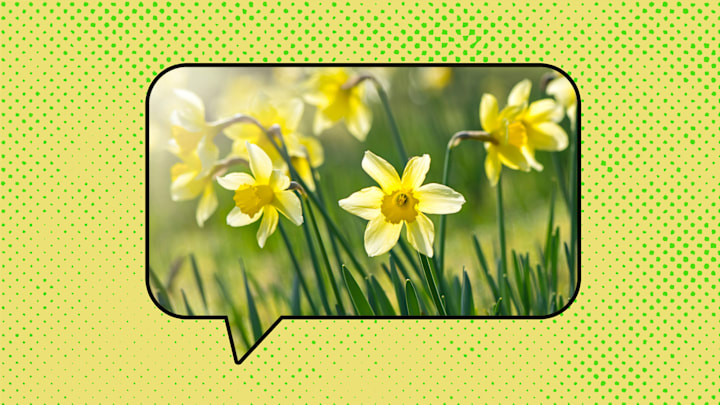With winter now (hopefully) behind us, the days are getting longer and warmer. So, unless we have some winnol-weather or lamb-storms on the way, it seems spring is finally coming. Here are 18 words for spring that you might find useful in the weeks and months to come.
Table of contents
- Vernalagnia
- Reverdie
- Valentining
- Chelidonize
- Chelidonian
- Erumpent and Breard
- Lamb-Storms, After-Winter, and Winnol-Weather
- Frondescentia, Frondescent, Frondescence, and Frondesces
- Routering-Bout
- Floriage, Floriation, and Efflorescence
Vernalagnia

Derived from lagneia, a Greek word meaning “lust,” vernalagnia is a more formal spring word for what’s otherwise known as “spring fever”—a brighter and often more romantic mood brought on by the return of fine weather in the spring. One 1958 medical dictionary described vernalagnia as the “awakening of sexual desire in the spring.” (Spring fever can also mean, as one 19th-century dictionary of American English put it, “the listless feeling caused by the first sudden increase of temperature in spring.”)
Reverdie
Borrowed into English in the late 1800s, the word reverdie is one of those spring words that has a long history in its native French dating back as far as the 14th century, at least. Derived from a verb, reverdir, meaning “to become green again,” a reverdie is a song, poem, or dance performed in celebration of the return of the spring.
Valentining

Since the 19th century, the chirruping of birds during the spring mating season is known as valentining. If you want to be even more specific, though …
Chelidonize
… the verb chelidonize is a proper word for the chirping of swallows as they fly overhead. It derives from the Greek word for swallow, chelidon—which is also the origin of …
Chelidonian
… the 17th-century adjective chelidonian. In addition to being used to describe anything that is the deep red color of a swallow’s throat, chelidonian winds are warm spring winds, so called because they tended to start blowing around the same time that swallows and martins began to return in the spring.
Erumpent and Breard

A word for the re-emerging of plants above the ground in spring, the 17th-century adjective erumpent describes anything that bursts forth. The very first appearance of a plant above the ground, incidentally, is called the breard.
Lamb-Storms, After-Winter, and Winnol-Weather
On the subject of spring weather, lamb-storms are spring thunderstorms, so called because they break around the same time that lambs are born. An after-winter, meanwhile, is a period of bad weather when spring should be due, while winnol-weather is a period of stormy or wintry weather around the feast day of St. Winwaloe on March 3.
Frondescentia, Frondescent, Frondescence, and Frondesces
According to an 18th-century dictionary of botanical terms, frondescentia is “leafing season,” or “the time of the year when plants first unfold their leaves.” Likewise, a plant that is frondescent is just beginning to bud or produce leaves; frondescence is the process of budding or producing leaves; and when a plant frondesces, it grows or puts forth leaves or buds. All four of these come from the Latin word for “leaf,” frons.
Routering-Bout

Router is an old Yorkshire dialect word meaning “to rush around noisily,” or, as the English Dialect Dictionary puts it, “to make a search amidst a confusion of things.” Derived from that, routering-bout is a thorough spring-cleaning of a house.
Floriage, Floriation, and Efflorescence
Coined in the 18th century, floriage is a blossom, or the collective flowers of a plant or tree. Likewise, a floriation is a decoration made of flowers (or, figuratively, a musical flourish), while efflorescence is the development or production of blossoming flowers.
A version of this story ran in 2018; it has been updated for 2024.
Read More About Spring:
